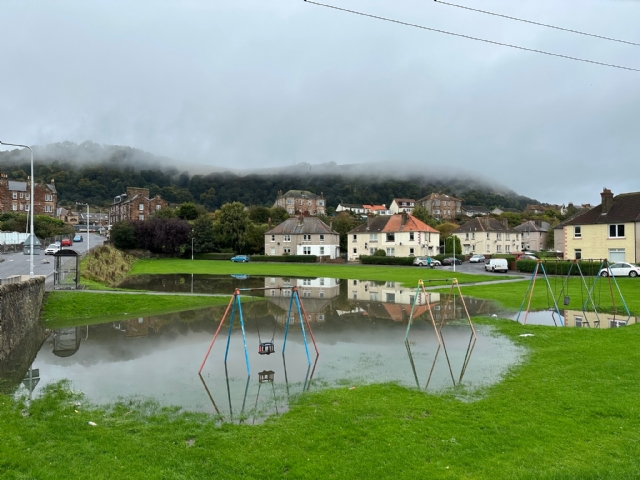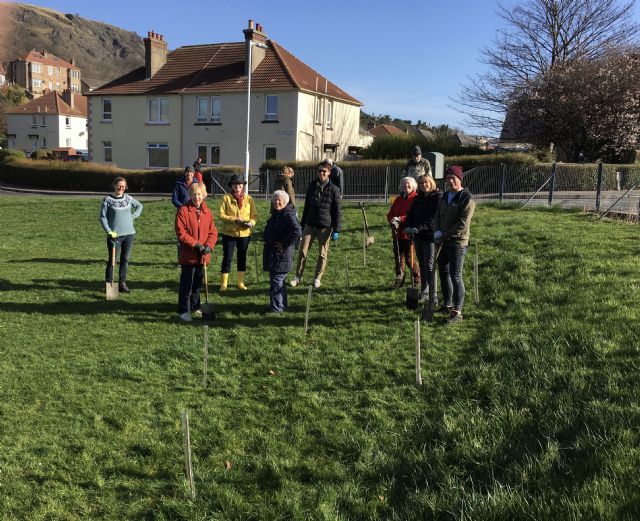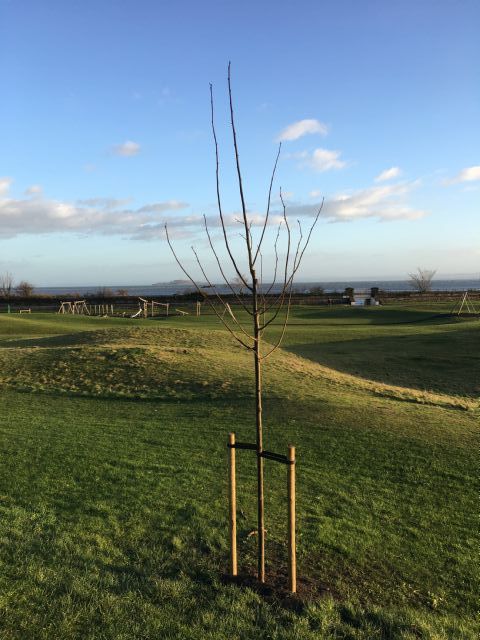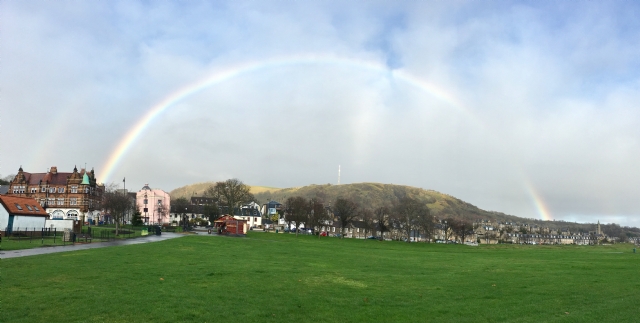
Environment News:
Recurrent flooding: A Freedom of Information request revealed that Scottish Water completed a Flood Investigation Report in March 2023. An update from Scottish Water is available in an appendix to our September CC Minutes. The recurring flooding occurs on Haugh Rd and at Kirkton Rd into the Dick Cres play park after heavy rain fall. This is due to a lack of capacity in the Combined Sewers when there is heavy rain and resulting surface water run off. This has been going on for many years and is not acceptable. We continue to pursue the issue with Scottish Water and seek a fuller report from them by March 2026.
Do not allow children or pets to play in flood water that may be contaminated with sewage (human waste).
Do not attempt to drive on flooded roads due to risk of engine and brake failure, and risk of hitting dislodged manhole covers or other debris.
Shore access at the cemetery railway underpass: This is now tricky as the repairs to the seawall/railway embankmemt have made the concrete slope steep and slippery. Network rail own this and have refused to put in access steps because they say it is not registered as a Right of Way. We think all the pedestrian railway underpasses meet the crietria as Rights of Way. However, when we took the matter to the Fiufe Council Access team, the Fife Access Forum decided these are 'permitted routes' and not Rights of Way. The Access team awaits a response from Netwrork rail about making this access / escape route safer. The concrete steps at the foot of Lochies Rd have lost their rusty handrail so be very careful if using these for shore access.
Damage to the seawall: Following storm damage to the rock faced railway embankment east of the beach in 2023 (storms Babet and Kieran), Network Rail made repairs. They were also requested to consider additional rock armour but have not taken this forward. Climate chaos puts us more at risk of storm damage and rising sea levels. Fife Council have a Coasts, Floods, and Harbours Team who are aware of the issues.
Herbicides: We met with Fife Council Grounds Maintenance Services (GMS) and members of Burntisland Community Development Trust (BCDT) on 6th July 2023 to discuss the use of pesticides, including weedkiller spraying, in and around Burntisland. We know this can be a challenging issue with many different opinions among residents. Check out the Community Action Plan June review results on on the CAP page and read what people said about managing parks and wee green spaces for nature and people. At a subsequent meeting on 21st November 2023, Burntisland Biodiversity Group (part of BCDT) agreed to consult further with local residents on managing our public green spaces better for nature and people. Fife Council are supportive. For further information on pesticide avoidance, this website may be helpful: https://www.pan-uk.org Consultation was included in the Community Action Plan review in June 2025. We have asked BCDT Biodiversity Group to take forward any actions in consultation with neighbours and communities.
Nature records: If you are interested in nature and able to accurately record what you see locally, please consider contributing your data to Fife Nature Records. This ensures that what we have and what we have lost can be accurately assessed, and helps provide evidence to Fife Council and other agencies on protecting our local wildlife sites e.g. the Fife Estuary SSSI and the Fife Council Listed Wildlife Sites on the Binn and Dunearn. Please see the tab on the right with links to the Fife Council website: https://www.fife.gov.uk/kb/docs/articles/environment2/fife-nature-records-centre
Environment: Climate Change & loss of Biodiversity:
At its simplest, our environment is where we live. It includes everything about Burntisland from our built environment (buildings, roads and structures) to our green spaces (parks and amenity areas within our town, and the woods and farmland around it).
Climate change: We have evidence that our planet has had several major changes in its climate over millennia, including ice ages. However, in our generation, we have come to realise that the world's temperature has been rising rapidly since the industrial revolution. This global warming is accelerating. Most scientists agree that the evidence is that our planet is heating up because of the way humans have been exploiting fossil fuels to power our industries and transport systems. Our warming world has changed the weather systems that we and all living things are used to - not all plants and animals are able to adapt fast enough to cope with this. Locally, we are seeing more wet mild winters, more strong winds, more hot dry summers, and more unpredictability - 'weather weirding'. Worryingly, the coldest parts of our planet, in the polar regions and high mountains, are becoming much warmer, leading to thawing of polar ice caps and melting of glaciers. As a result, sea levels are rising, and storm surges and floods are becoming more common.
Biodiversity: Human populations have risen dramatically since the industrial revolution. We dominate our planet. Our hunger for more resources to sustain us and the lifestyles we want have left less and less space for other lifeforms that share our world - habitat loss. We have upset previously balanced global ecosystems. Our use of natural resources and man-made chemicals have created waste that we have allowed to pollute our seas, fresh water, soils, and air. This pollution threatens to poison life on Earth, including us.
What can we do locally to combat these issues? We can reduce reliance on fossil fuels (e.g. for heating and vehicles). We can better insulate our homes. We can reduce, re-use, and recycle items. We can dispose of litter and chemicals safely. We can reduce reliance on chemicals like herbicides and fertilisers. We can look to mitigate flood risks. We can seek better food security - this means more locally sourced foods and using agriculture wisely. We can plan better - always considering what effects our decisions will have on our environment. We can make space for nature by the way we use our green spaces. By taking CO2 (a 'greenhouse gas' that helps to warm our planet) from the atmosphere, plants, including growing trees, help combat climate change and can reduce surface water flood risks. We can make choices that are better for our health and our environment. We can share good ideas and work together - because we're all in it together.
Burntisland Community Council (& Burntisland Community Development Trust) are members of Fife Communities Climate Action Network - FCCAN
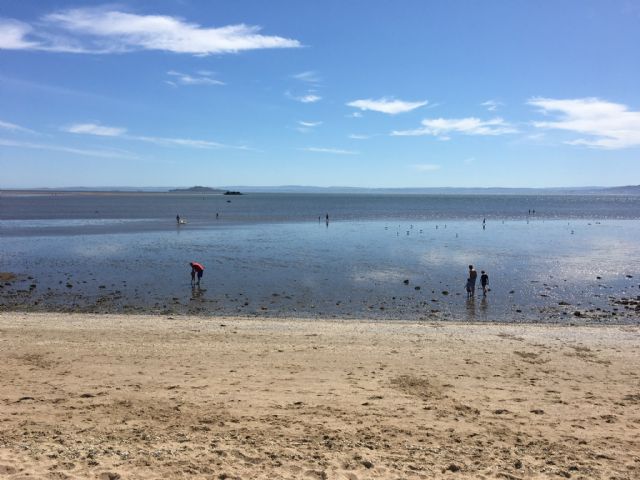
Burntisland beach - keep our beach & sea clean
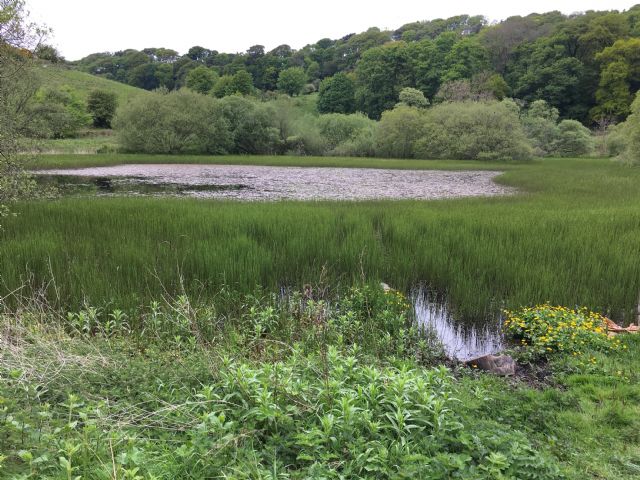
Binn Pond & woods - homes for nature

